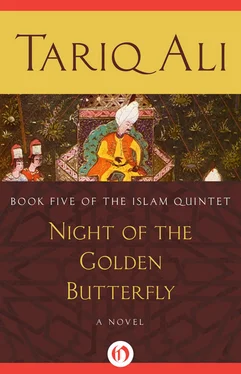Zaynab was born in one of the many large houses built amid the dozen villages and thousands of acres that made up her family’s estate. This one was not far from the small town of Jamsadiq and a four-hour drive to the satanic city Karachi, so all modern conveniences were available, and some of the primitives affected an ultra-cosmopolitan personality when they appeared at the Sind Club.
When she was eight or nine, Zaynab’s extraordinary beauty began singling her out for special attention. Her father, who adored her, died when she was twelve. Her older brother, who inherited his father’s share of the estate, was a dour and reactionary primitive. He saw how all who came into contact with her worshipped his young sister. She was singularly devoid of artifice. Her private tutors, all of them female, had educated her well. In addition to Sindhi and Urdu, she could read Arabic and Persian and speak English and French. She possessed a natural grace that was obvious at first glance. Word of her beauty had spread throughout the province. The primitives discussed it often, and many young bloods were determined to win her hand. Which primitive would her family bless? Bets were laid and, unbeknown to Zaynab, a fierce rivalry had already commenced. There were demands from primitives with even more land than Zaynab’s family. They all wanted an immediate engagement, so that as soon as she was seventeen they could pretend she was eighteen and celebrate the nuptials.
Zaynab’s mother had died giving birth to her, and her father’s second wife was a coldly calculating society woman from Karachi, not in the slightest bit interested in little Zaynab or her older brothers. In fact, she was rarely on the estate. Her main interest was accumulating enough jewellery and money so that she could scarper to a European city after the old man died. This she achieved successfully, if not gracefully, and when last heard of was living in Knightsbridge, close to an Egyptian grocery.
Samir Shah, the small-minded, bigoted oldest brother, was smitten with jealousy of his sister. He knew that had Zaynab been born a man, she would have displaced him completely. She was still only twelve years of age, and already tales of her small kindnesses to the families of serfs who served in the household had spread throughout the villages, and there were many expressions of regret that she had been born a woman.
Sámir Shah called a conference of male elders to decide his sister’s fate. These primitives met and agreed that the only bridegroom worthy of her, clearly, was the Koran. Her favourite brother, Sikandar, fought valiantly on her behalf, but he was only sixteen himself at the time. The poor boy was brutally mocked for his immaturity and even more for his disregard for property. He stormed out in tears.
This was as much as I’d known of Zaynab’s story before she arrived.
We exchanged pleasantries while Ally laid the table and offered us wine. Zaynab did not refuse. She asked how my life of Plato was proceeding. I muttered a noncommittal reply.
‘Tell me honestly’, she asked, ‘is there much to write about? Might it not be simpler for you to just write an essay to go with his paintings?’
‘He told me to write everything, and much of that would be unsuitable as an introduction to his paintings.’
‘I don’t see why. They’re explicit enough.’
‘In a way they are, but they still require a great deal of interpretation. Wait till you see the collection that our hostess wanted him to destroy because it was a complete “male fantasy and totally sexist”. Rather than do that he gave it to me, and I thought you might like to see his earlier work so I’ve brought it along. Ally was unfair. I just think he had seen too many erotic Japanese works, where they draw these things very large. This was Plato’s version of all that and it isn’t without a certain charm. Not that Ally agrees.’
‘Dara’, said Ally, ‘I’ve been meaning to say this: Do you mind not addressing me as Ally anymore? Everyone I know calls me Alice.’
‘But why?’
‘Because Eliot hates “Ally”.’
‘Why? It sounds like Ali as it’s pronounced here, and given his own faith it should make him feel closer to you. How pathetic of Plato to call you Alice. And you, Ms Stepford, agreeing to let a male decide how you should be addressed. Shame.’
Zaynab, clearly feeling that the discussion of nicknames had become tedious, successfully diverted the conversation.
‘I love the way you call him Plato so naturally. For me he’s Pervaiz, sometimes Payjee, but I might try Plato. Sounds nice the way you say it.’
Alice announced supper just as Zaynab was leafing through the Plato penises. She smiled at some of the drawings but lingered on none. I knew then that the book would stay with me. Ally had been looking over her shoulder.
‘Zay-Nab, don’t you think I was right? I may have mellowed somewhat, but I still think that these paintings offer nothing to the world or to anyone.’
‘Not to me,’ said Zaynab in a reflective tone. ‘But they obviously meant something to him or he wouldn’t have done them. I think Dara as his biographer should retain custody, as we often say in our country. Perhaps one of them could be the cover of your book on Plato.’
‘Perhaps not. Perhaps they could replace Fatherland flag, more representative of the people who run the country.’
Zaynab laughed. ‘I’ll suggest it to my brother, who’s now a senior minister for something.’
‘Corruption?’
‘Suppertime, children.’
Zaynab seemed so self-assured and at ease in the world that I wondered whether her life had been as much of a tragedy as it had been painted by Plato and others. I knew that Alice would broach the subject before too long, and she did not disappoint me.
‘Zay-Nab, er, we’ve been wondering. Plato said he had fallen in love with a married woman. Is your husband alive or are you divorced?’
‘Neither, really, Alice.’
Alice, slight puzzled, looked at both of us in turn. ‘I give up. What’s the mystery?’
‘Surprised Plato hasn’t told you. I’m married to our Holy Book.’
‘What? Is this real? Are you kidding? Dara, did you know?’
‘Yes. These things happen in Fatherland.’
Zaynab explained her plight to an astonished Alice, who had thought she knew everything on matters related to gender. It was wonderful watching her face register an escalating scale of incredulity as Zaynab’s story proceeded. The effect was enhanced by the deep calm voice in which Zaynab told it.
‘In my part of the country the big landlords are so desperate to preserve their estates that anything that threatens the size of their holdings has to be fought. As a female I was entitled to my share of the property — under Islamic law that’s a half of what the men inherit. Were it not for sharia I would get nothing at all. Makes one think. In the absence of laws that insist on a totally equal share, it’s better to get something. Don’t you agree, Alice?’
Would Alice agree? She would. I snorted with delight, only to be silenced by a gesture from Zaynab.
‘Even a quarter of a man’s share of our estate amounted to thousands of acres, and in the natural course of events all that land would have gone out of the family. If I married and had children, my share of the estate would be divided among them, diminishing the family holdings. Even if I married a cousin, my brothers would lose my share. There was one remedy, a scheme devised many moons ago: a female whose right of inheritance threatened her family’s estate could be married to the Koran. So a ceremony took place when I was twelve in which the local pir , a retarded pockmarked primitive — a male cousin of mine — declared my marriage to the Koran legal and holy. For a month I was locked up with our Holy Book and nothing else. Food would be left outside, and none of the maids was allowed to speak to me. How I wished my mother were still alive.
Читать дальше












